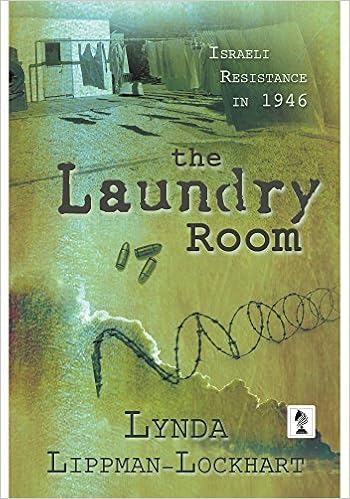A
recent release from Penmore Press, Lydia Lippman-Lockhart’s novel The LaundryRoom tells the story of the Israeli resistance of 1946.
In
today’s interview Lockhart opens up about the emotional genesis of the book. “On
my tour to Israel, one of the stops was at the Ayalon Institute. The place, and
what went on there, captured my imagination. When I returned home I started
doing research and found almost nothing about it. That was six years ago.
I contacted the museum and received an email from one of the youth who had
participated in the clandestine operation. We corresponded for two years while
I wrote the book. Sadly she died one month before the book came out. Almost
every important incident in the book is true.”
MJN: You have a degree in education and spent 26
years teaching English at a high-school. Incidentally, it was a career I had
once contemplated. Then I realized that our educational system has become
extremely bureaucratic and politically polarized and standardized, without much
latitude for creativity. God help you if you deviate one step from the approved
curriculum. At least that was my experience. I realize every state, every
district is different. I imagine, your experience was a positive one. Otherwise
you wouldn't have lasted 26 years. Do any of the frustrations I expressed ring
a bell?
LLL: I also
felt the strain of government bureaucracy, but what I did in my classroom was
not an issue. Yes, there were certain curricular activities I was supposed to
teach, but I had the latitude to do it my way. I loved every minute. I have
been to my student's college graduations, weddings, baby-namings, and still
reap the benefits.
MJN: Does your teaching tenure provide any kind
of miniature marketing platform? Do you still stay in touch with some of your
students and their parents, who would welcome a chance to read your book?
LLL: I have
been retired eight years, yet my faculty has been a terrific support system by
attending my book signings, liking my Facebook posts, and linking me to others.
MJN: Israel's position is rather controversial.
That's what makes writing about it so interesting. No conflict - no story.
Right? That being said, do you get annoyed when people ask you questions,
"So what is your position on ____?" I am asking because I write about
Irish history and the nationalistic movement, so there's always one person in
the audience who asks me, "So whose side are you on?"
LLL: I have
never been put on the spot. My story was more about conviction and loyalty than
it was about one particular country. Every country has had their heroes.
MJN: In my experience, one thing that suburban
Jewish Americans do not always realize is that Israeli culture is very
different from their own. They romanticize their brothers and sisters in the
Middle East. They even take that coveted trip to Israel in order to see the
holy landmarks, expecting it to be an eye-opening experience. And it does end
up being an eye-opening experience - but not in the sense that they had
expected. Can you elaborate on that a bit?
LLL: I have been
to many countries, but there is something about Israel that crosses the boundaries
of one’s imagination. My experience was much more than I could have ever
imagined. Three of the world's most influential religions were born there. Yes,
there are problems there, but what country doesn't have problems? Look what
Ireland endured for so long.
MJN: Can you recommend any films that touch upon
the early days of modern Israel? I can think of one The Black Book. It does
briefly show life in a kibbutz, though most of the film is set in Holland
during WWII.
LLL: I'm not
familiar with any film available in the US. That's why my book should be made
into a film.


No comments:
Post a Comment